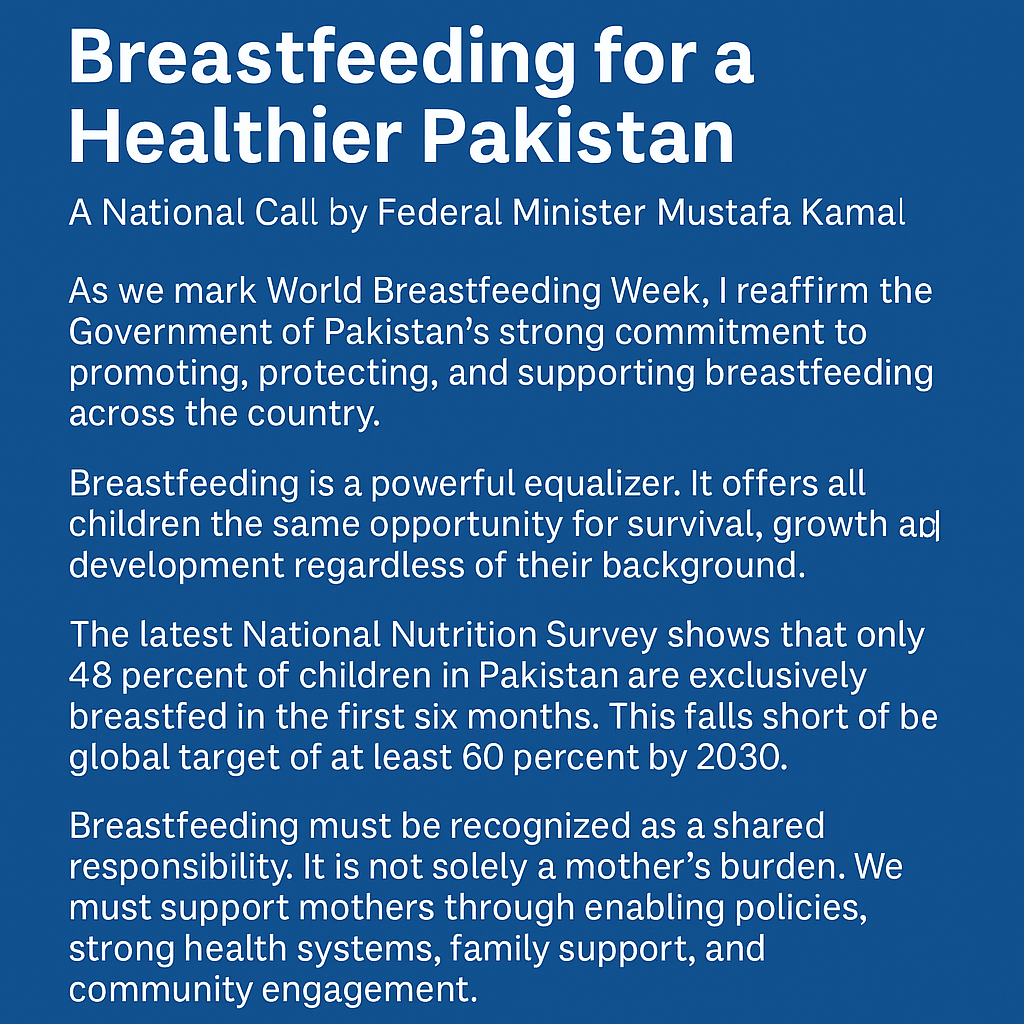Mustafa Kamal Reaffirms Pakistan’s Commitment to Breastfeeding During World Breastfeeding Week
On World Breastfeeding Week, Federal Health Minister Syed Mustafa Kamal emphasized the critical importance of breastfeeding for child survival, maternal health, gender equality, and national development. He called for collective action and policy reform to support mothers across Pakistan.
Web Desk Digital MQM
8/7/20252 min read


Breastfeeding for a Healthier Pakistan: A National Call by Federal Minister Mustafa Kamal
In a powerful statement issued during World Breastfeeding Week 2025, Federal Minister for National Health Services, Regulations and Coordination, Syed Mustafa Kamal, reaffirmed the Government of Pakistan’s unwavering commitment to promoting, protecting, and supporting breastfeeding nationwide.
“Breastfeeding is not only nature’s best start in life for a child—it is a vital investment in Pakistan’s future,” said the federal minister.
Breastfeeding: A Cornerstone of National Development
The minister emphasized that breastfeeding directly contributes to Pakistan’s health goals, women’s empowerment, and economic development. It is a powerful equalizer, ensuring every child receives the same opportunity to survive and thrive—regardless of their socio-economic background.
Calling it the “first vaccine”, Mustafa Kamal highlighted that breast milk contains critical antibodies and nutrients that protect against infections, chronic illnesses, and malnutrition, while supporting emotional bonding and brain development.
Urgent Gaps and National Nutrition Survey Findings
The latest National Nutrition Survey reveals a stark reality: only 48% of infants in Pakistan are exclusively breastfed during their first six months—far below the global target of 60% by 2030.
Although progress has been made in early initiation and continued breastfeeding, the minister acknowledged that “more work is needed to close the gap and ensure no mother or child is left behind.”
A Shared Responsibility: Beyond the Mother
“Breastfeeding must be recognized as a shared responsibility, not solely a mother’s burden,” the statement added. The government is moving toward an inclusive, multisectoral approach, involving:
Stronger health systems
Community engagement
Family and workplace support
Legislative action
The Government of Pakistan is also committed to enforcing the International Code of Marketing of Breastmilk Substitutes, in alignment with the WHA 2016 resolution.
Empowering Mothers in Communities and Workplaces
Mustafa Kamal stressed the importance of community-based support, such as Lady Health Workers, peer counselors, and grassroots health professionals—especially in areas with limited health facilities. Linking facility-based care with home-based support ensures continuity and confidence for new mothers.
The statement also called on public and private sectors to adopt family-friendly workplace policies, including breastfeeding breaks, lactation rooms, and flexible schedules to support working mothers.
Breastfeeding as a Gender Equality Issue
The minister framed breastfeeding as a gender equity concern, highlighting the disproportionate burden of unpaid care carried by women. He called for a shift towards a respectful, informed, and enabling environment where women are empowered to breastfeed without stigma or structural obstacles.
A National Responsibility
“Breastfeeding is a national responsibility,” Mustafa Kamal emphasized. “Policymakers, healthcare providers, employers, civil society, media, and families must come together to make breastfeeding the norm—not the exception.”
He concluded by reminding the nation that breastfeeding is more than a feeding method—it is a right, a lifeline, and a foundation for a healthier, stronger Pakistan.
